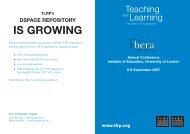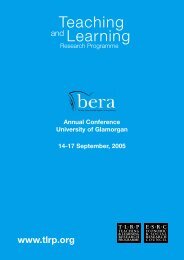Towards Evidence-based Practice in Science Education 4
Towards Evidence-based Practice in Science Education 4
Towards Evidence-based Practice in Science Education 4
Create successful ePaper yourself
Turn your PDF publications into a flip-book with our unique Google optimized e-Paper software.
that their judgment of their own practice<br />
should be <strong>based</strong> on explicit evidence, or that,<br />
if there were empirical evidence that a specific<br />
teach<strong>in</strong>g approach led <strong>in</strong> general to better<br />
learn<strong>in</strong>g outcomes, they would naturally adapt<br />
their own practice. The importance of<br />
professional judgement, tacitly acquired<br />
through experience, was a theme throughout<br />
the discussions..<br />
Many participants could identify professional<br />
<strong>in</strong>teractions as both sources of research<br />
knowledge and opportunities for <strong>in</strong>fluence on<br />
practice. Colleagues, <strong>in</strong>-service education and<br />
the activities of professional associations<br />
(notably the Association for <strong>Science</strong><br />
<strong>Education</strong>) were seen as dissem<strong>in</strong>ators, filters<br />
and translators of research. For all, a<br />
perceived lack of time and the lack of<br />
accessibility of research f<strong>in</strong>d<strong>in</strong>gs through<br />
direct and <strong>in</strong>direct means were seen as<br />
barriers to explor<strong>in</strong>g or exploit<strong>in</strong>g research.<br />
Significant<br />
<strong>in</strong>fluences of<br />
research<br />
Participants <strong>in</strong> this study saw educational<br />
research as beneficial and <strong>in</strong>fluential on<br />
practice. However, as other studies have also<br />
noted (Kennedy, 1997; DETYA, 2001), unless<br />
research evidence, <strong>in</strong>clud<strong>in</strong>g that from highly<br />
regarded studies, was seen to accord with<br />
experience and professional judgement, it<br />
was unlikely to be acted on:<br />
When we talk about it we wouldn't th<strong>in</strong>k to<br />
ourselves ‘oh my word we are us<strong>in</strong>g research<br />
now’. We th<strong>in</strong>k this is a good idea and it fits<br />
<strong>in</strong> with our ethos and so we will try it. We will<br />
do that first and then we might look at the<br />
research f<strong>in</strong>d<strong>in</strong>gs that have backed it up. But<br />
we wouldn't look at research first and say ‘oh<br />
there are so many more improved results,<br />
therefore we will do it’.<br />
[Hazel, secondary teacher with<br />
research experience]<br />
Teachers with research experience were<br />
generally able to discuss how their own<br />
<strong>in</strong>teraction with a research community or<br />
specific research evidence had impacted on<br />
their practice.<br />
Impact on a national scale was seen to come<br />
through curriculum output from research<br />
which had a direct bear<strong>in</strong>g on pupils’ learn<strong>in</strong>g<br />
<strong>in</strong> science - such as teach<strong>in</strong>g materials and<br />
<strong>in</strong>-service tra<strong>in</strong><strong>in</strong>g. Thus, major research and<br />
developments projects <strong>in</strong> science education,<br />
such as CASE (Cognitive Acceleration<br />
through <strong>Science</strong> <strong>Education</strong>) fulfilled the criteria<br />
which, from our study, are likely to optimise<br />
the impact of research on practice. That is:<br />
• conv<strong>in</strong>c<strong>in</strong>g research f<strong>in</strong>d<strong>in</strong>gs which<br />
• resonate with professional experience, and<br />
result <strong>in</strong><br />
• practical strategies for classroom practice<br />
which are<br />
• widely dissem<strong>in</strong>ated through a variety of<br />
professional networks.<br />
Yet, even then, there were some teachers<br />
who found such a body of evidence<br />
unconv<strong>in</strong>c<strong>in</strong>g.<br />
Major implications<br />
This study suggests that educational<br />
research does <strong>in</strong>fluence practice and policy.<br />
However, few participants seemed to have a<br />
sense that research can provide evidence to<br />
warrant particular actions and choices <strong>in</strong><br />
specific teach<strong>in</strong>g situations. Rather<br />
classroom practice is <strong>in</strong>fluenced and<br />
changed by practical strategies whose<br />
orig<strong>in</strong>s may lie <strong>in</strong> research evidence but<br />
whose dissem<strong>in</strong>ation has relied on translation<br />
by researchers, colleagues and/or <strong>in</strong>-service<br />
tra<strong>in</strong><strong>in</strong>g providers. Teachers with first hand<br />
experience of a research culture seem better<br />
able to view professional practice through a<br />
different, ‘evidence-<strong>based</strong>’ lens, br<strong>in</strong>g<strong>in</strong>g their<br />
understand<strong>in</strong>g of research to bear critically<br />
where their professional context allows.<br />
Widespread use of research evidence <strong>in</strong> the<br />
classroom seems to depend on at least two<br />
factors:<br />
• tangible and useful outcomes, such as<br />
curriculum materials and teach<strong>in</strong>g<br />
approaches, result<strong>in</strong>g from transformation<br />
of research f<strong>in</strong>d<strong>in</strong>gs <strong>in</strong>to practical<br />
strategies;<br />
• the presence of a professional culture<br />
which encourages both exploration of<br />
research and changes to practice.<br />
The picture drawn from these f<strong>in</strong>d<strong>in</strong>gs is that<br />
science teachers are will<strong>in</strong>g to consider<br />
research evidence, but, unless already<br />
experienced <strong>in</strong> research, have a limited<br />
understand<strong>in</strong>g of the processes and claims<br />
of much social science research. Many<br />
science teachers set demand<strong>in</strong>g criteria for<br />
‘research’ which studies aim<strong>in</strong>g to show that<br />
a teach<strong>in</strong>g approach ‘works’ may f<strong>in</strong>d difficult<br />
to satisfy. It would appear that many of our<br />
What of the <strong>in</strong>fluence of research on policy?<br />
Comments throughout <strong>in</strong>terviews and focus<br />
groups made reference to narrowness of<br />
national tests as the current means of<br />
measur<strong>in</strong>g educational success and a<br />
h<strong>in</strong>drance to reflection and change <strong>in</strong><br />
teachers’ practice. Policy documents and the<br />
assessment regime were seen as very<br />
<strong>in</strong>fluential on practice and a barrier to<br />
research-<strong>based</strong> <strong>in</strong>novation <strong>in</strong> teach<strong>in</strong>g.<br />
We would have to be less results driven.<br />
That would be the biggest change. People<br />
who get good results are scared to change <strong>in</strong><br />
case their results go down. Schools who are<br />
successful may not see why should they<br />
change.<br />
[Hazel, secondary teacher with<br />
research experience]<br />
respondents set ‘research’ on a pedestal,<br />
and saw any actions of their own to evaluate<br />
changes <strong>in</strong> practice as a somewhat different<br />
category of activity. This dichotomy has<br />
implications for efforts to <strong>in</strong>crease evidence<strong>based</strong><br />
practice <strong>in</strong> science education.<br />
There are two possible responses to this<br />
dichotomy: either that teacher education (ITT<br />
and/or CPD) aim to provide opportunities for<br />
teachers to reflect more deeply on the nature<br />
of enquiry <strong>in</strong> education, so as to arrive at a<br />
more considered view of what is possible,<br />
and what might count as ‘sound evidence’<br />
as a basis for action; or that researchers<br />
adopt more rigorous and challeng<strong>in</strong>g designs<br />
<strong>in</strong> order to improve the quality of their<br />
f<strong>in</strong>d<strong>in</strong>gs and the persuasiveness of<br />
implications drawn from them. Increas<strong>in</strong>g<br />
evidence-<strong>based</strong> practice is likely to require<br />
both.<br />
A rather different vision of evidence-<strong>based</strong><br />
practice is one <strong>in</strong> which teachers make more<br />
systematic use of data collected on their own<br />
practice to <strong>in</strong>form decisions about what<br />
needs to be changed, and whether changes<br />
that are <strong>in</strong>troduced do <strong>in</strong> fact ‘work’. Here<br />
the issues seem to be rais<strong>in</strong>g the status of<br />
data as a basis for action and improv<strong>in</strong>g the<br />
quality of the data that is collected, by<br />
provid<strong>in</strong>g tools that enable this to be done<br />
more thoughtfully, more systematically and,<br />
not least, more easily, by busy practitioners.<br />
Models of evidence-<strong>based</strong> practice which<br />
<strong>in</strong>corporate both knowledge aris<strong>in</strong>g from<br />
research and more tacit professional<br />
knowledge need to be more actively<br />
explored.<br />
Most primary teachers showed a fundamental<br />
trust that policy documents (from QCA, DfES)<br />
are <strong>based</strong> on research, though secondary<br />
teachers were more sceptical. Many<br />
participants saw the <strong>in</strong>fluence of research on<br />
science education policy as opaque, implicit,<br />
and via the <strong>in</strong>fluence of particular people<br />
rather than the nature of particular research<br />
evidence.<br />
I would presume that the National Curriculum<br />
has .. that there has been research <strong>in</strong>volved<br />
before the powers that be wrote it.<br />
[Louise, primary teacher without<br />
research experience]<br />
References<br />
DETYA (Department of <strong>Education</strong>, Tra<strong>in</strong><strong>in</strong>g and Youth Affairs) (2001). <strong>Education</strong>al Research: In whose<br />
<strong>in</strong>terests? Higher <strong>Education</strong> Series Report no. 39. Canberra: DETYA Higher <strong>Education</strong> Division.<br />
Hargreaves, D.H. (1996). Teach<strong>in</strong>g as a research-<strong>based</strong> profession: possibilities and prospects. The Teacher<br />
Tra<strong>in</strong><strong>in</strong>g Agency Annual Lecture 1996.<br />
Kennedy, M.M. (1997). The connection between research and practice. <strong>Education</strong>al Researcher, 26, 7, 4-12.<br />
Slav<strong>in</strong>, R.E. (2002). <strong>Evidence</strong>-<strong>based</strong> education policies: Transform<strong>in</strong>g educational practice and research.<br />
<strong>Education</strong>al Researcher, 31, 7, 15-21.<br />
Teach<strong>in</strong>g and Learn<strong>in</strong>g Research Programme<br />
www.tlrp.org

















